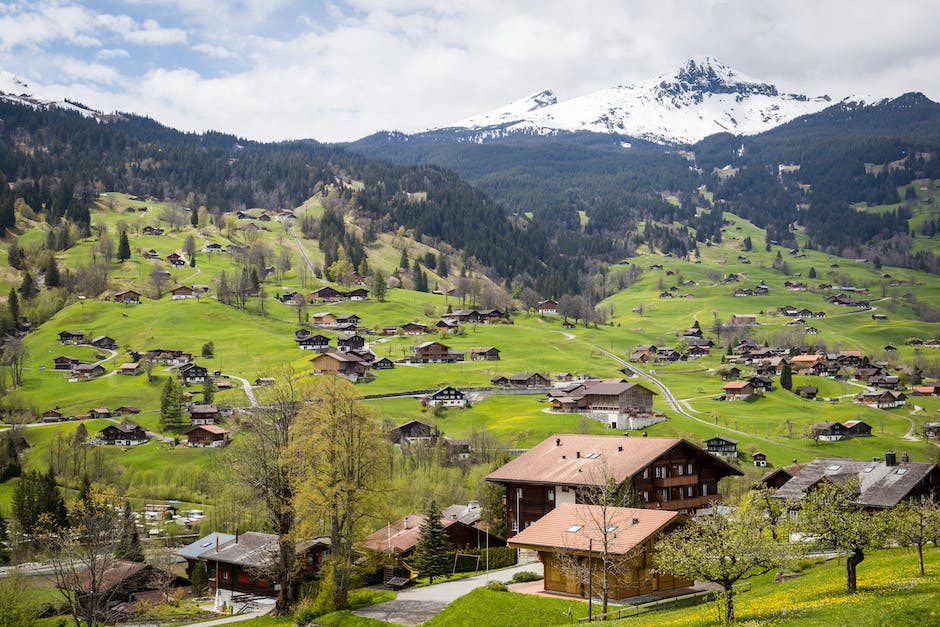Is Switzerland the Most Expensive Place to Live
Blink, and you might miss the hefty price tag attached to the enchanting Swiss Alps or the breathtaking horizons of Switzerland’s cities. Nestled in the heart of Europe, this picturesque nation has garnered a reputation as a playground for the elite, with a lifestyle as opulent as its chocolate. But is Switzerland truly the priciest place to call home?
In this article, we will dive into the depths of Switzerland’s cost-of-living conundrum. No frills, no fuss, just a quest for the truth behind the glamour. Brace yourself, for we are about to unravel the factors that make Switzerland a contender for the title of the world’s most expensive location to take root.
Table of Contents
- Experiencing the High Cost of Living in Switzerland
- Unveiling the Factors Behind Switzerland’s Expensiveness
- The True Price of Swiss Quality: An Analysis
- Surviving the Expense: Tips for Living Economically in Switzerland
- Exploring Cost-Effective Alternatives to Switzerland’s Exorbitant Living Expenses
- Is Switzerland Worth the Cost? Weighing the Pros and Cons
- FAQs
- Key Takeaways

Experiencing the High Cost of Living in Switzerland
Living in Switzerland may be a dream for many, but it comes with a hefty price tag that can take some getting used to. Everything from housing to groceries tends to be more expensive compared to other countries, making the cost of living significantly higher. It is essential to understand and prepare for these expenses before making the move.
One of the most significant factors that contribute to the high cost of living in Switzerland is housing. Finding a suitable place to live can be challenging and expensive, especially in major cities like Zurich or Geneva. Rent prices are notoriously high, and even purchasing property can come with a hefty price tag. Additionally, utilities and maintenance costs for a home can quickly add up, further increasing the overall expenses.
- Groceries and dining out in Switzerland are considerably more expensive than in other countries. Food prices are high due to various factors such as strict food regulations, high quality standards, and import costs. Dining at restaurants or grabbing a quick meal can also strain your budget, with prices for a simple lunch often surpassing expectations.
- Transportation costs are another aspect that contributes to the high cost of living. Switzerland offers excellent public transportation, but its convenience comes at a price. Train tickets, in particular, can be quite expensive, especially for long distances or high-speed trains. Even owning a car can be costly, with high insurance rates and fuel prices.
- Healthcare expenses in Switzerland are known to be exorbitant. While the quality of healthcare is exceptional, the price can be a burden. Residents are required to have mandatory health insurance, which can cost a significant amount each month. On top of that, deductibles and co-payments can quickly add up, depending on the type of treatment required.
Living in Switzerland undoubtedly has its perks, but it’s crucial to be well-informed about the high cost of living before making the decision to relocate. By planning your finances carefully, researching housing options thoroughly, and making informed choices about your everyday expenses, you can better adapt and manage the financial challenges that come with living in such a beautiful but expensive country.

Unveiling the Factors Behind Switzerland’s Expensiveness
Switzerland’s expensiveness has perplexed many, prompting a closer look at the factors that contribute to its high cost of living. Let’s delve into this enigma and uncover the underlying reasons behind Switzerland’s lofty price tags.
1. Strong Swiss Franc: The Swiss franc has long been a robust currency, bolstered by the country’s economic stability and reputation as a safe haven for investors. While this strengthens Switzerland’s position on the global stage, it also leads to higher prices for imported goods, as the purchasing power of the franc increases. Consequently, everyday items like groceries or clothing can be notably more expensive.
2. Quality Comes at a Price: Switzerland is renowned for its impeccable quality standards across various industries. From watches and chocolates to precision machinery and pharmaceuticals, Swiss products uphold an unparalleled reputation for excellence. This meticulous attention to detail and uncompromising commitment to superior craftsmanship often translates into higher price points. Consumers pay a premium for the exceptional quality that is synonymous with Swiss-made goods.
3. High Wages: In Switzerland, the average wage is comparatively higher than many other countries. With a staunch commitment to ensuring fair compensation, Swiss workers enjoy generous salaries that align with the country’s high living standards. However, this also contributes to the overall cost of goods and services, as businesses pass on the expense of higher wages to consumers.
4. Costly Housing: Switzerland’s picturesque landscapes, coupled with strict planning regulations, have driven up housing costs. Limited space and high demand result in inflated prices for both purchasing and renting properties. Urban centers, such as Zurich and Geneva, bear the brunt of this phenomenon, making accommodation a significant contributor to Switzerland’s expensiveness.
While Switzerland’s expensiveness may be a deterrent for some, it is worth recognizing the country’s exceptional quality, economic stability, and high standard of living. The factors discussed shed light on the intricacies of Switzerland’s pricing structure, allowing us to better understand the reasons behind its reputation as an expensive destination.

The True Price of Swiss Quality: An Analysis
Delving behind the scenes of Swiss craftsmanship unveils a fascinating analysis, shedding light on the real value associated with their renowned quality. When it comes to Swiss products, be it watches, chocolates or precision instruments, the price tag often leaves us wondering: what justifies the premium? Through a closer examination, it becomes evident that the superb craftsmanship, meticulous attention to detail, and exceptional standards are the contributing factors that make Swiss quality truly priceless.
It all starts with the Swiss commitment to precision. A deep-rooted tradition that spans generations, meticulous artistry is embedded in their DNA. Every Swiss product undergoes an exhaustive process, ensuring unrivaled levels of accuracy. From the intricate movements of a timepiece to the delectable symphony of flavors infused in Swiss chocolates, the minute details are flawlessly executed. With a relentless pursuit of perfection, Swiss craftsmen leave no room for compromise, crafting each piece with unmatched dedication.
- Unparalleled attention to detail: Swiss quality excels in leaving no stone unturned, resulting in flawlessly executed products that meet the highest standards.
- Innovation and precision: Constantly pushing the boundaries of excellence, innovation intertwines with precision, setting Swiss products apart.
- Legacy of craftsmanship: The Swiss have perfected their artistry over centuries, passing down age-old techniques from one generation to the next, safeguarding their rich heritage.
- Unwavering commitment to quality: From stringent quality control measures to perfecting even the smallest components, Swiss craftsmanship guarantees durability and reliability in every product.
Ultimately, the true price of abiding by Swiss quality stems from the relentless pursuit of perfection. This analysis effectively uncovers the extraordinary craftsmanship present in every Swiss creation. It is this never-ending commitment to precision, innovation, and attention to detail that transforms Swiss quality into an unparalleled standard, making it absolutely invaluable.

Surviving the Expense: Tips for Living Economically in Switzerland
Living in Switzerland can be a dream come true, but dealing with its high cost of living can quickly turn that dream into a nightmare. However, with a few smart strategies, you can navigate the expenses and thrive economically in this beautiful country.
To begin with, one of the key ways to save money in Switzerland is by being mindful of your daily expenses. Start by creating a budget that includes all your essential expenditures, such as rent, groceries, and transportation. By tracking your spending habits, you’ll gain a better understanding of where your money is going and identify areas where you can cut back.
Another valuable tip is to explore alternative housing options. Switzerland may be notorious for its high rental prices, but there are alternative ways to find affordable accommodations. Consider house-sharing or renting a room in a shared apartment, which can significantly reduce your monthly expenses. If you’re open to a more unconventional living situation, you could even explore house sitting opportunities or join a home exchange program.
When it comes to groceries, shopping strategically is essential to save your hard-earned cash. Look out for special offers, discounts, and compare prices across different stores. Moreover, opting for locally produced, seasonal foods not only supports local businesses but can also be more affordable. Buying in bulk and cooking your meals at home rather than eating out can further reduce your expenses. Don’t forget to pack your own lunch for work, as eating out daily can quickly take a toll on your wallet.
Switzerland boasts an excellent public transportation system, and utilizing it can significantly cut down your transportation expenses. Consider purchasing a half-fare card or a monthly pass, which offer substantial discounts if you commute frequently. Additionally, ditching the car altogether and embracing cycling or walking can not only save you money but also contribute to a healthier lifestyle.

Exploring Cost-Effective Alternatives to Switzerland’s Exorbitant Living Expenses
Switzerland, renowned for its stunning landscapes and high standard of living, can often come with a hefty price tag. However, there are a plethora of cost-effective alternatives to consider without compromising on the quality of life. From pristine mountain towns to vibrant urban centers, Switzerland offers a range of options that won’t break the bank.
1. Hidden Gems: Take a closer look at lesser-known Swiss destinations that are often overlooked but offer an equally enchanting experience. Explore the charming town of Fribourg, with its well-preserved medieval architecture and vibrant local culture. Or venture to Lugano, nestled in the Italian-speaking region of Ticino, where you can bask in the Mediterranean climate and indulge in delicious cuisine. These hidden gems not only provide a more affordable cost of living but also offer a unique and authentic Swiss experience.
2. Explore Beyond the Big Cities: While Zurich and Geneva may be among the most expensive places to live, Switzerland has plenty of affordable options beyond these bustling urban centers. Consider settling in cities like Basel or Lausanne, which offer a high quality of life at a fraction of the cost. These cities boast rich cultural scenes, excellent public transportation, and a range of recreational activities. By looking beyond the popular destinations, you can find more affordable accommodation, dining, and entertainment options, without compromising on the Swiss way of life.
In summary, Switzerland may be known for its high living expenses, but there are numerous cost-effective alternatives to explore without sacrificing the beauty and quality of this remarkable country. Uncover hidden gems and explore beyond the big cities to find affordable yet equally charming destinations that offer a fulfilling Swiss experience. Whether you seek tranquil mountain escapes or the vibrant buzz of urban life, Switzerland’s alternatives have something for everyone, all while being friendly to your wallet.

Is Switzerland Worth the Cost? Weighing the Pros and Cons
Switzerland, a country renowned for its mesmerizing landscapes and impeccable quality of life, often prompts travelers and potential residents to ponder whether its high cost of living is justified. Let’s dig into the pros and cons to help you make an informed decision.
Pros:
- Breathtaking Scenery: Nestled in the heart of the Alps, Switzerland offers unparalleled beauty at every turn, perfect for nature lovers and outdoor enthusiasts.
- High Standard of Living: Swiss cities boast excellent infrastructure, efficient public transportation, top-notch healthcare, and top-tier education systems, providing a high quality of life for its residents.
- Reliable Economy: Switzerland houses several multinational corporations and is globally recognized as a financial hub, offering stable employment opportunities.
Cons:
- Cost of Living: As no surprise, Switzerland comes with a significantly high cost of living, from accommodation and groceries to dining out and entertainment.
- Language Barrier: Although English is widely spoken, the country’s official languages are German, French, Italian, and Romansh, so a basic knowledge of at least one local language is beneficial.
- Strict Immigration Policies: Switzerland has stringent regulations when it comes to migration and obtaining long-term residency, which can pose challenges for those considering a move to the country.
By weighing these pros and cons, you can gauge whether Switzerland is well worth the cost for your needs and aspirations.
FAQs
Q: Is Switzerland the most expensive place to live?
A: Yes, Switzerland is commonly considered one of the most expensive countries to live in.
Q: What makes Switzerland so expensive?
A: Several factors contribute to Switzerland’s high cost of living. These include high wages, a strong currency, high taxes, and excellent infrastructure and public services.
Q: Is housing costly in Switzerland?
A: Absolutely. Housing in Switzerland is notorious for being expensive, with rents or property prices significantly higher compared to other countries.
Q: How about groceries and everyday items?
A: Prepare your wallet! Groceries and everyday items in Switzerland tend to be pricier compared to many other nations. Expect higher costs for food, household goods, and personal care products.
Q: Are transportation expenses high in Switzerland?
A: Yes, transportation costs can be quite hefty. Fuel prices, tolls, public transportation fares, and vehicle maintenance expenses contribute to Switzerland’s overall high transportation costs.
Q: Is dining out expensive in Switzerland?
A: Dining out can put a strain on your budget. Restaurants, cafes, and bars in Switzerland often have steep prices for food and drinks. Be prepared to spend a bit more for a night out.
Q: How about healthcare expenses?
A: Healthcare in Switzerland is renowned for its quality but comes at a price. Health insurance premiums and out-of-pocket costs can be quite high, so it’s important to consider these expenses when living in Switzerland.
Q: Is it still possible to save money in Switzerland?
A: While the high cost of living may make it challenging, saving money is still possible in Switzerland. Careful budgeting, making smart choices when it comes to housing, transportation, and lifestyle, can help you save for the future.
Q: Are there any benefits to the high cost of living in Switzerland?
A: Absolutely. The high cost of living often corresponds with excellent public services, infrastructure, and a high standard of living. Switzerland offers great healthcare, top-notch education, a safe environment, and an efficient transportation system.
Q: Is Switzerland only for the wealthy?
A: No, Switzerland is not exclusively for the wealthy. While the cost of living may be high, various income levels can find ways to live comfortably in Switzerland. It all depends on individual lifestyles and priorities.
Q: Are there any tips for managing expenses in Switzerland?
A: Certainly! Some tips include planning and budgeting, taking advantage of public transportation, buying groceries in bulk, cooking at home, comparing prices, using discount cards, and seeking out free or low-cost activities. These strategies can help mitigate the impact of the high cost of living.
Key Takeaways
In conclusion, Switzerland can indeed be considered one of the most expensive places to live. With its high cost of living, particularly in major cities like Zurich and Geneva, residents and expats alike should be prepared to budget carefully. The country’s superb quality of life and range of opportunities may attract many, but it’s important to consider the financial implications. From housing and groceries to transportation and leisure activities, expenses can quickly add up. However, it’s worth noting that Switzerland also offers competitive salaries and excellent public services, which can help offset the higher costs. Ultimately, whether it’s the mountains, chocolate, or career prospects that draw you to Switzerland, being aware of its high living expenses will undoubtedly contribute to a more financially sound and enjoyable experience in this beautiful country.







